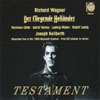Wagner (Der) Fliegende Holländer
Keilberth’s 1955 Ring has received rave reviews – can his Dutchman be as good?
View record and artist detailsRecord and Artist Details
Composer or Director: Richard Wagner
Genre:
Opera
Label: Testament
Magazine Review Date: 10/2006
Media Format: CD or Download
Media Runtime: 141
Mastering:
Stereo
ADD
Catalogue Number: SBT21384

Tracks:
| Composition | Artist Credit |
|---|---|
| (Der) Fliegende Holländer, '(The) Flying Dutchman' |
Richard Wagner, Composer
Astrid Varnay, Senta, Soprano Bayreuth Festival Chorus Bayreuth Festival Orchestra Elisabeth Schärtel, Steersman, Tenor Hermann Uhde, Holländer, Tenor Josef Traxel, Mary, Contralto (Female alto) Joseph Keilberth, Conductor Ludwig Weber, Daland, Bass Richard Wagner, Composer Rudolf Lustig, Erik, Tenor |
Author: Alan Blyth
This enthralling performance has always been a highly recommended version. Its stereo incarnation was available only briefly on LP: when it was issued on CD by Teldec it appeared only in mono. Now Testament has had access to the original stereo tapes and, as in the case of the same year’s Ring now in progress, the sound is truly amazing, allowing us to enjoy the intense, vital performance even more than in the past.
As with the Ring, Keilberth seemed on high in 1955; once again his reading moves with electrifying concentration from scene to scene. Keilberth had rehearsed Wolfgang Wagner’s new production but Knappertsbuch conducted the first three performances (you can hear how different, more pawky his approach is from Keilberth’s in various reissues, none in stereo, taken from a Bavarian Radio broadcast). Keilberth achieves a greater unanimity of approach from his players and absolutely superb singing from the chorus (trained by the remarkable Wilhelm Pitz). The orchestra, perhaps because they knew they were being recorded, play their hearts out to create a fusion of notes and rhythm that is really thrilling from start to finish.
The singers are no less inspired. Uhde gives a supreme interpretation of the tortured, yearning Dutchman, on a par with that of Hans Hotter and more evenly sung. His firm, compact, grainy tone is used with his customary artistry to convey the character’s longing for salvation, total elation in the love duet, and desperation when he thinks Senta has betrayed him. Phrase after phrase etches itself in the mind in this unmissable portrayal. Incredibly Varnay, who was also Brünnhilde in 1955, brings to Senta a tireless dedication and vision to match Uhde’s hero. She fines her large voice down to the more intimate needs of Senta, and only once or twice do the most taxing passages, as her final outburst, slightly strain her resources.
Ludwig Weber’s earthy, experienced Daland is another rewarding interpretation. Lustig, who took over Erik from Windgassen, makes rather a throaty sound in the manner of earlier German Heldentenors, but he has all the notes and conveys the character’s understandable frustrations. The Mary is admirable. All seem under the spell of the work and the conductor in a reading that now has the stereo sound it so richly deserves.
As with the Ring, Keilberth seemed on high in 1955; once again his reading moves with electrifying concentration from scene to scene. Keilberth had rehearsed Wolfgang Wagner’s new production but Knappertsbuch conducted the first three performances (you can hear how different, more pawky his approach is from Keilberth’s in various reissues, none in stereo, taken from a Bavarian Radio broadcast). Keilberth achieves a greater unanimity of approach from his players and absolutely superb singing from the chorus (trained by the remarkable Wilhelm Pitz). The orchestra, perhaps because they knew they were being recorded, play their hearts out to create a fusion of notes and rhythm that is really thrilling from start to finish.
The singers are no less inspired. Uhde gives a supreme interpretation of the tortured, yearning Dutchman, on a par with that of Hans Hotter and more evenly sung. His firm, compact, grainy tone is used with his customary artistry to convey the character’s longing for salvation, total elation in the love duet, and desperation when he thinks Senta has betrayed him. Phrase after phrase etches itself in the mind in this unmissable portrayal. Incredibly Varnay, who was also Brünnhilde in 1955, brings to Senta a tireless dedication and vision to match Uhde’s hero. She fines her large voice down to the more intimate needs of Senta, and only once or twice do the most taxing passages, as her final outburst, slightly strain her resources.
Ludwig Weber’s earthy, experienced Daland is another rewarding interpretation. Lustig, who took over Erik from Windgassen, makes rather a throaty sound in the manner of earlier German Heldentenors, but he has all the notes and conveys the character’s understandable frustrations. The Mary is admirable. All seem under the spell of the work and the conductor in a reading that now has the stereo sound it so richly deserves.
Discover the world's largest classical music catalogue with Presto Music.

Gramophone Digital Club
- Digital Edition
- Digital Archive
- Reviews Database
- Full website access
From £8.75 / month
Subscribe
Gramophone Full Club
- Print Edition
- Digital Edition
- Digital Archive
- Reviews Database
- Full website access
From £11.00 / month
Subscribe
If you are a library, university or other organisation that would be interested in an institutional subscription to Gramophone please click here for further information.





